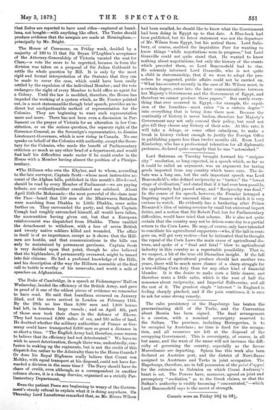*The Hillmen who own the Khyber, and to whom, according
to the late surveyor, Captain Scott—whose most instructive ac- count of the Afghan hills, published in this month's Blackwood, should be read by every Member of Parliament—we are paying tribute, are evidentlyneither conciliated nor subdued. About April 25th the Mohmunds—the most powerful of the clans near the Pass—heard that 150 men of the Mhairwarra Battalion were marching from Dhakka to Little Dhakka, some miles further on. They surrounded the party, and though Captain Creagh had roughly entrenched himself, all would have fallen, the ammunition having given out, but that a European reinforcement was dispatched from Dhakka. These enabled the detachment to withdraw, with a loss of seven British and twenty native soldiers killed and wounded. The affair in itself is of no importance, except as it shows that the Hill- men are hostile, and that communications in the hills can enly be maintained by permanent garrisons. Captain Scott is very decided upon that point, though he also believed that the highlanders, if permanently overawed, might be tamed into fair citizens. He had a profound knowledge of the Hills, and his description of the way the Hillmen assemble at the first call to battle is worthy of his namesake, and worth a mile of speeches on Afghanistan.


































 Previous page
Previous page